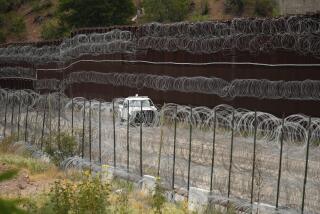Protect it? President Trump’s travel ban threatens America
- Share via
It was obvious that Donald Trump would do dramatic things early on as president to shake up an existing order that he and many of his supporters believe is bad for America. But the stunning cruelty and ineptitude with which Trump abruptly imposed a temporary ban on all refugees and on immigration from seven majority Muslim nations — causing commotions at airports from San Diego to New York and nightmares around the world — should give even his admirers pause. Presidencies are often haunted by early missteps, and this one was gargantuan.
Before announcing the new rule Friday, Trump and his inner circle didn’t consult any of the high-powered national-security officials in his Cabinet, including, as reported by The New York Times, Defense Secretary James Mattis and Homeland Security Chief John Kelly. Had they been involved, there is a far better chance that the new policy would have been crafted with more care and might not have accepted the paranoid fiction that all refugees are a security threat with none deserving of kindness. It probably would have pinned down such crucial details as how those with green cards from Iraq, Iran, Sudan, Somalia, Syria, Libya and Yemen would be treated by customs authorities.
Instead, these legal residents of the U.S. faced 48 hours of intense confusion and fear.
There will be many Trump supporters who rally to his aides’ insistence that the media exaggerated problems and that the turmoil at airports was at least as much due to protests and problems Delta had with its computers. But it says something that the American Civil Liberties Union, which raises $4 million online in a typical year, raised six times that this weekend.
The travel ban, by its and by human nature, is divisive. There are different ways to view it. The oversimplification of the policy as a “Muslim ban” may work as an opposition hashtag on Twitter or as propaganda among supporters of the Islamic State who called the order a “blessed” ban because it sows anti-American sentiment, but the vast majority of the world’s Muslims, including those from Saudi Arabia, which produced most of the 9/11 conspirators, weren’t covered. And any notion that there wouldn’t be some support for blocking immigration from seven majority Muslim nations is undercut by what many Americans seem to think. One May 2016 poll showed 50 percent of American voters — and 37 percent of Hillary Clinton supporters — would support a total temporary ban on Muslim immigration.
Even though the Cato Institute recently pegged the average chance of dying in an attack by a foreign-born terrorist on U.S. soil over the past 40 years at 1 in 3.6 million a year, many Americans remain fearful of a repeat of what Europe has seen the past two years since the Syrian civil war triggered a mass influx of Muslim refugees. Border security and better vetting of immigrants should be U.S. priorities, but the reality is that American border controls are far stronger and that Muslims in America are far better integrated into our society.
So how badly was this bungled? This weekend’s fiasco has so many implications beyond immigration, only starting with its threat to America’s standing in the world. It also harms America’s ability to attract the talented immigrants who have fueled so much economic growth, and it introduces a level of uncertainty and doubt into global affairs that could have profoundly destabilizing effects.
Ultimately, the gravest implications have to do with what Donald Trump may do next with his White House powers. Thanks to another executive order, the adviser who most seems to have the president’s ear — former Breitbart News chief Steve Bannon — now has a high-profile seat on the “principals committee” of the National Security Council and will have more involvement there than the chairman of the Joint Chiefs of Staff or the director of national intelligence.
Bannon’s brusque approach — he just suggested the media “keep its mouth shut and just listen for a while” — clearly mirrors Trump’s. If the president doesn’t expand his circle of close advisers to others with more diplomacy and a broader worldview, the world’s view of America may shift irrevocably.
As The San Diego Union-Tribune Editorial Board noted in September, “Terrible leaders can knock nations off course.” This weekend, Trump and his political advisers may have started to do just that.
Twitter: @sdutIdeas
Facebook: UTOpinion
More to Read
A cure for the common opinion
Get thought-provoking perspectives with our weekly newsletter.
You may occasionally receive promotional content from the Los Angeles Times.











